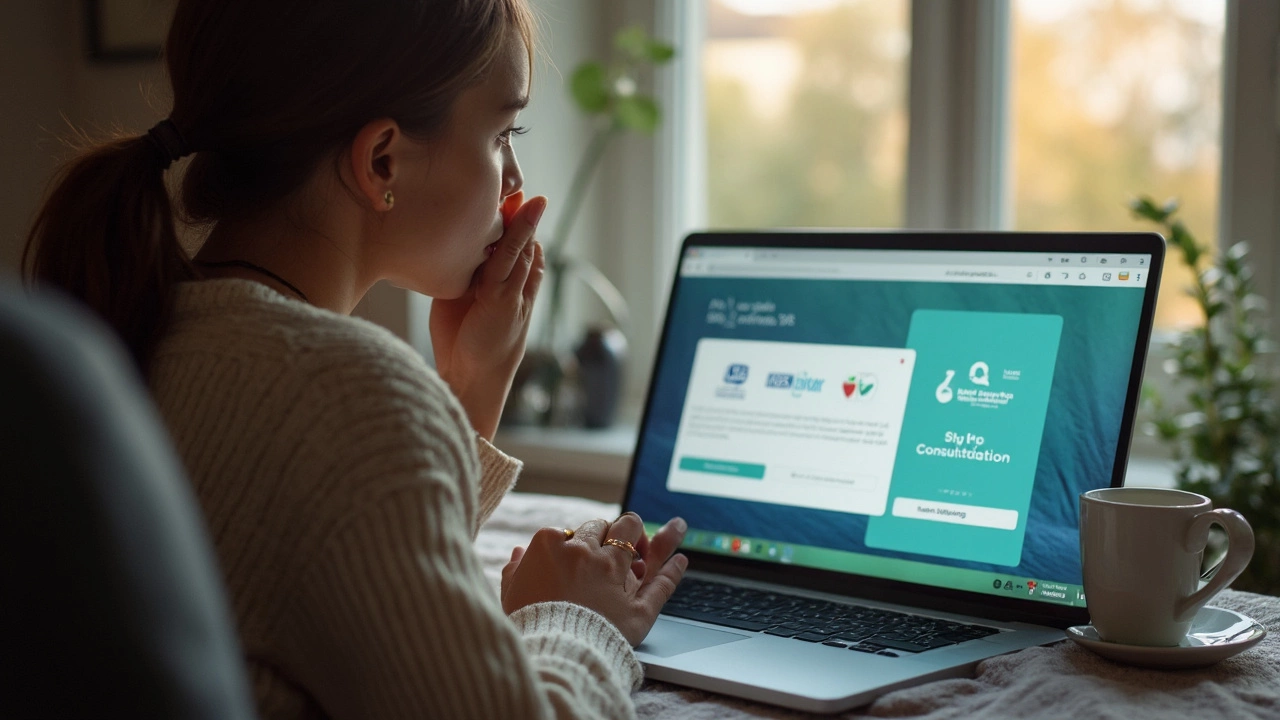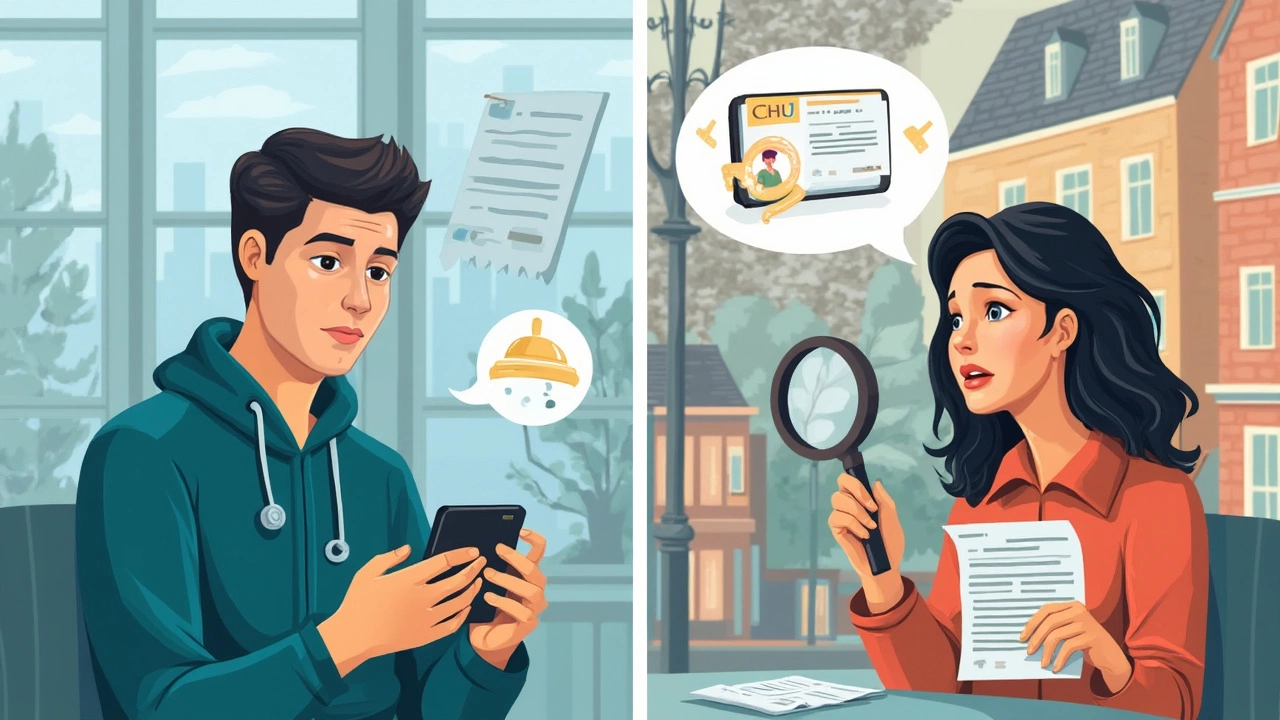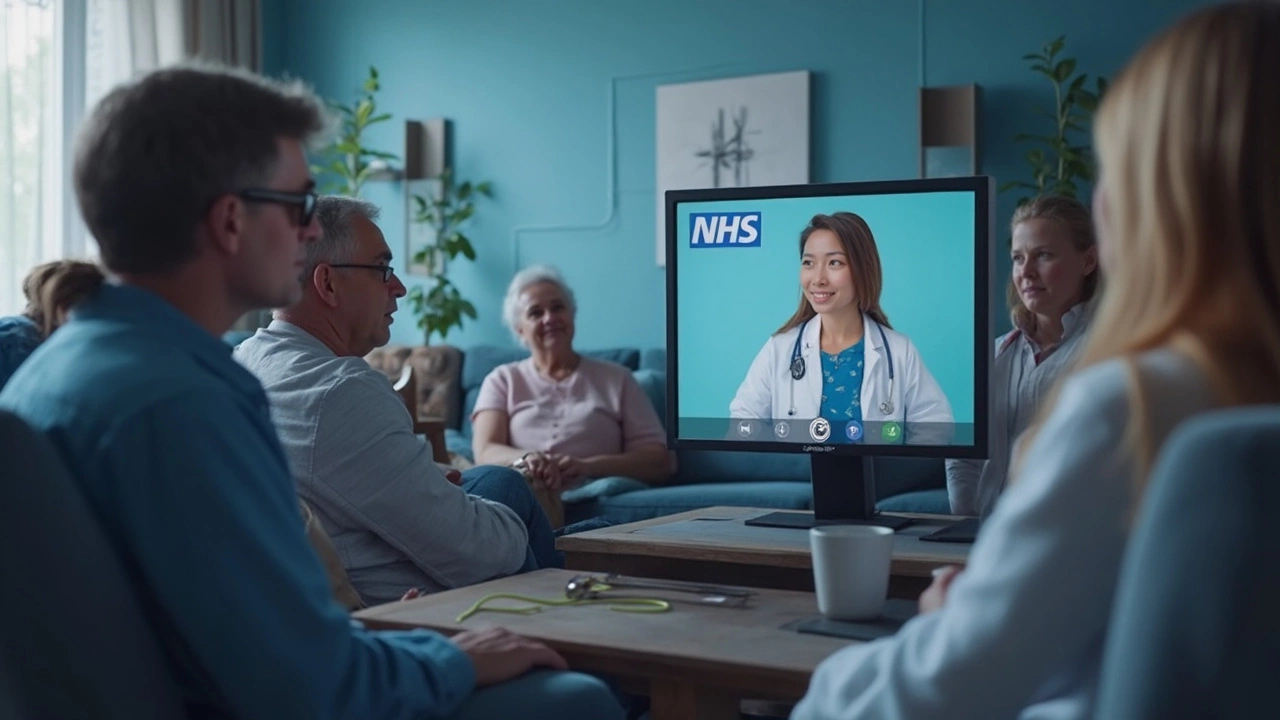Is Ask a Doctor Online Free? What to Expect from Online Doctor Consultations

Google “ask a doctor online free” and you’ll be hit with dozens of websites promising instant answers. Sounds dreamy, right? But how much can you really get for nothing? The truth: most of these platforms give you basic info, not a full medical consultation, unless you’re willing to pay.
Let’s cut through the confusion. Some sites let you drop a question for free, but what you usually get is a short reply—not a full checkup, prescription, or ongoing support. If you want a doctor to review your records, write a sick note, or recommend a prescription, you’ll almost always hit a paywall.
Don’t let slick headlines fool you—“free” comes with fine print. Still, there are ways to get helpful info without opening your wallet. But first, you need to know what you’re signing up for and how to spot the difference between reliable advice and a sales pitch.
- What Does 'Ask a Doctor Online' Really Mean?
- Are Free Online Doctor Services Really Free?
- When You Might Have to Pay—And Why
- Tips for Using Online Doctor Platforms Safely
- Alternatives and Getting the Most Out of Free Advice
What Does 'Ask a Doctor Online' Really Mean?
At first glance, “ask a doctor online” sounds like you can just type your medical question and instantly get help from a real physician. But here’s the thing: this phrase covers a huge range of services, from simple symptom checkers to full video chats with licensed doctors.
Some platforms let you send a health question to a pool of doctors who reply within a few hours—or even minutes. These answers might be short (think: a quick reassurance or a suggestion to see someone in person). On other platforms, you can schedule a one-on-one chat or video call with a virtual doctor. This can look a lot like a regular clinic visit but done over your phone or laptop.
There’s a big difference between getting generic health info, personalized medical advice, or a real prescription. Here’s what “ask a doctor online” can mean:
- Health forums: A place where you ask questions and either doctors or community members reply. It’s usually not private, and the info isn’t tailored to you.
- Chatbots or AI tools: You enter symptoms and get automated suggestions. It can be handy for basic issues, but don’t expect expert advice here.
- Free question submission: You post a question and a doctor might send you a quick reply. These replies usually stick to health education, not specific medical action.
- Paid consultations: This is where you chat, call, or video with an actual doctor licensed to give specific advice, write prescriptions, or order lab tests. Most legit telemedicine sites fall into this category.
Some well-known services like HealthTap, JustAnswer, or Practo offer the chance to “ask” an online doctor, but if you want more than a generic answer, you’ll be prompted to pay. A 2024 survey showed that 67% of users looking for free online doctor consultation were surprised by unannounced fees when they tried to access real medical help.
So, when you see the words “ask a doctor online free,” don’t assume you’re getting that full, private, real-time doctor experience for nothing. Most likely, you’ll get either basic advice or a sales prompt for a paid service.
Are Free Online Doctor Services Really Free?
If you search for ask a doctor online platforms, most make a big deal about being 'free.' But here’s what’s actually going on behind the scenes. Free doesn’t always mean what you probably think. The majority of these online services have some kind of catch.
Here’s how they work: a lot of sites let you send a quick question at no charge, but the answer you get is usually super short—think a sentence or two. Sometimes it’s not even from a real doctor, but from automated bots or moderators. If you want a detailed response, a one-on-one chat, or a guaranteed answer from a licensed physician, that’s when you’re prompted for payment.
- Online doctor consultation platforms like JustAnswer, Practo, or HealthTap usually have a "first question free" model, but pretty quickly, you’ll be nudged toward a subscription or one-time fee for anything beyond surface-level advice.
- Ads and upselling are everywhere. A lot of sites show ads for their premium services or even for medications and clinics while you ask your hotline questions.
- Personal data isn’t always private. Sometimes, you give up detailed health info just for a shot at a free answer. Always read the privacy policy before sharing anything sensitive.
If you’re wondering just how often you’ll run into paywalls, check out this straightforward comparison:
| Platform | Is it really free? | What you actually get |
|---|---|---|
| HealthTap | No—only limited free questions, with many paid options | Short doctor responses, detailed answers cost extra |
| JustAnswer | First question often free, but follow-ups are paid | Direct chats with doctors after payment |
| Practo | Some free advice, but full consults are paid | General advice via public Q&A, paid for private consultations |
If you truly need quick, free health advice, search for nonprofit options or check if local health departments or hospitals have “ask a nurse” phone lines. But always remember: anything that sounds completely free should make you look twice. There’s often a trade-off—whether it’s limited info, ads, or data collection. The promise of a full-fledged free virtual doctor consultation is more myth than reality for most big-name platforms.

When You Might Have to Pay—And Why
If you’re using an ask a doctor online service, the free part only goes so far. Here’s how it typically works: most platforms start with a free option, but anything beyond the basics usually means pulling out your credit card. Wondering where the line gets drawn? Let’s break it down.
- Detailed Answers: You might get a short, general reply for free, but if your question needs a deep dive—like understanding blood test results or getting an explanation of your symptoms—a fee often kicks in.
- Prescriptions: Almost no free online doctor consultation will let you get a prescription without payment. Writing and sending prescriptions comes with legal steps, and doctors don’t do that for free online.
- Medical Certificates/Sick Notes: Need proof for your boss or school? Most platforms charge extra to issue any official paperwork, since doctors need to verify things more closely.
- Follow-Up Questions: One free question, maybe. But come back with follow-ups and you’ll usually need to subscribe or pay for a private chat.
- Video or Phone Consultations: Text chat might be free for general things, but if you want to talk face-to-face with a real doctor, that almost always requires a paid plan or one-time fee.
If you’re finding a website that lets you ask unlimited, detailed health questions for free and promises prescriptions as well, pause for a reality check. Doctors need to be paid for their medical advice and liability is a big deal, even online.
Here’s a quick look at what popular telemedicine sites typically charge for common services:
| Service | Free? | Typical Cost (USD) |
|---|---|---|
| Basic health question | Sometimes | $0 - $5 |
| Prescription | Rarely | $15 - $50 |
| Medical certificate | No | $10 - $25 |
| Live video consult | No | $40 - $99 |
Finally, keep in mind that some insurance plans now cover certain online health advice services. So if you have insurance, check for partnerships—they might pick up the bill for your virtual visit.
Tips for Using Online Doctor Platforms Safely
Lots of folks use ask a doctor online services now, but you still need to keep your guard up. Not every website or chat is legit, and you’re sharing sensitive stuff. Here’s how you can keep your health and info safe while picking the right online doctor consultation platform.
- Check who you’re talking to. Look for sites that clearly show their doctors’ names, medical licenses, and areas of expertise. A trustworthy platform should let you click into the doctor’s profile and see real credentials.
- Look for privacy and security features. A legit website uses HTTPS (look for the lock icon in your browser). They should tell you how they protect your data, like not sharing your health info with advertisers.
- Read reviews, not just ratings. Glowing star ratings can be misleading. Instead, scan actual user reviews or look for feedback on third-party sites—especially about response times and accuracy of advice.
- Don’t rely on “free” for emergencies. If your question is urgent or life-threatening, don’t use a free online doctor consultation. Go to an ER or call a doctor directly. These platforms are mostly for quick advice or second opinions, not emergencies.
- Be honest about your symptoms. Don’t hold back or sugarcoat how you’re feeling. Clear, honest info helps the doctor give better advice. But remember, with basic free services, you likely won’t get a full diagnosis or treatment plan.
- Check for follow-up options. Some reputable sites let you message back for clarification, but others charge after one reply. Know what you’re getting—if you need more than a single answer, read the site’s policy first.
| Feature | Trusted Platform | Risky Platform |
|---|---|---|
| Doctor credentials listed | Always | Rarely or only vague info |
| HTTPS/Privacy Policy | Clearly present | Missing or unclear |
| Direct communication | Secure chat/video | Unmonitored forms or generic emails |
| Payment transparency | Clear before you start | Hidden fees after question |
| User support | Always available | No or unclear contact info |
Don’t forget: If something feels sketchy or if they ask for personal info that doesn’t make sense, it’s okay to back out and pick a more trustworthy service. There are plenty of solid telemedicine options out there if you know where to look.

Alternatives and Getting the Most Out of Free Advice
If you’re not ready to pay for a full online doctor consultation, don’t worry—there are other ways to get your health questions answered without spending a dime. But it helps to be smart about where you look and how you use the answers you get.
Some solid free options actually come from government or official health sites. The CDC (Centers for Disease Control and Prevention) and NHS (UK’s National Health Service) offer detailed advice on anything from colds to chronic illness. These aren’t personal chats, but the info is written by real doctors and reviewed regularly. For things like rashes, medication side effects, or common symptoms, these sources give you up-to-date, safe info you can trust.
Don’t forget about health forums run by nonprofit groups (think Mayo Clinic, MedlinePlus, or American Heart Association). You can often search old threads or ask non-urgent questions—it’s not as direct as ask a doctor online services, but you do get good, no-nonsense answers from doctors and people who understand the conditions you’re curious about.
Here’s how to get the most out of the free advice online:
- Be specific in your question—give symptoms, how long you’ve had them, and anything you’ve already tried. Vague questions get vague answers.
- Don’t rely just on a quick reply if it’s an emergency. Free advice is great for weird rashes, not chest pain.
- Check that answers come from either credentialed doctors or officially recognized sites. If you’re not sure who’s replying, treat advice like a first step, not the final word.
- Bookmark answers that make sense and compare more than one source, especially if you’re making health decisions.
Plenty of sites let you try before you buy—think of initial free messages as a preview, not the whole movie. Platforms like HealthTap or WebMD’s symptom checker offer free basic suggestions, but if you want a prescription or real-time chat, you’ll see a fee notice right away.
| Service | Type of Free Advice | Paid Upgrade? |
|---|---|---|
| WebMD Symptom Checker | Automated health suggestions | No live doctor - paid for telehealth |
| HealthTap | Free written doctor replies | Pay for video consults |
| Mayo Clinic Q&A | Trusted info and community questions | No live consults |
| Reddit/Health Forums | Community-based advice | N/A |
The big takeaway? Free services are a good way to get general health info or double-check something you’re worried about. But for anything confusing, weird, or urgent, it’s worth stepping up to a paid virtual doctor consultation or seeing your local doctor in person.
Popular Posts

Understanding the Need for Physiotherapy: When and Why
Physiotherapy can play a crucial role in improving one's quality of life by addressing pain, mobility issues, and various physical challenges. This article explores the multitude of reasons someone might seek out physiotherapy, from post-injury recovery to chronic pain management. We also delve into useful tips and interesting facts about physiotherapy and how it can serve as a personalized treatment option. Whether you're an athlete, an office worker, or someone dealing with chronic health issues, understanding the benefits of physiotherapy could be your first step towards a healthier living.

Is Cosmetic Surgery Regulated in the UK?
Cosmetic surgery is big business in the UK, but is it properly regulated? This article dives into the rules and guidelines ensuring patient safety and the quality of services. Understand what regulations exist, who enforces them, and how you can make informed decisions about cosmetic procedures. Discover some surprising facts about the industry and get tips on choosing the right practitioners.

Understanding UK Private Health Insurance Costs per Month
Private health insurance in the UK varies in cost based on several factors including age, coverage level, and personal health. This article explores these factors, helping you understand what influences monthly premiums. We'll provide insight into typical costs, explain the differences between individual and family plans, and offer tips on finding the best policy for your needs.

Is it Mandatory to Have Health Insurance in the UK? A No-Nonsense Guide
Trying to figure out if health insurance is a must in the UK? This guide clears up the rules, explains how the NHS fits in, and why some people still go private. Learn who needs health insurance, what your actual choices are, and what you get for your money. We’ll dig into the little details that actually matter for families, students, and anyone new to the country. Plus, practical tips to help you feel confident about your coverage.